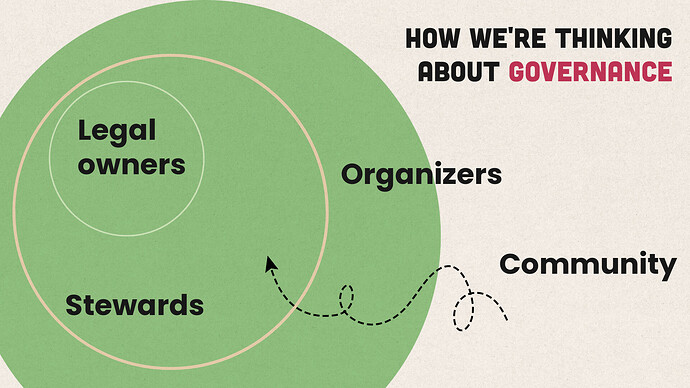Building Our Cooperative
Mirlo is possible because people come to us from a place of abundance and are able to donate time and resources to keep us running. Dozens of musicians, coders, listeners, advisors, and others have contributed time, money, energy, and attention to get Mirlo to where it is today. As we get closer to finishing the first iteration of the software, it is also important to clarify how we organize ourselves to keep the project sustainable as it continues to grow.
Mirlo was founded with the spirit of cooperation among workers and musicians as a guiding principle. When we became a legal business entity in 2023 (a requirement in order to use payment processing tools like Stripe), we formed a USA-based Limited Liability Company called Mirlo US LLC and created an operating agreement grounded in worker cooperation and consent-based decision-making. At the time, two of the core members who were based outside of the USA agreed to continue as informal partners because the tax implications of being a legal co-owner of a US LLC were cumbersome. As a digital platform legally located in the US, we anticipate that this will also be the case for others who we would otherwise like to be involved in sharing responsibility for the platform. We know that a large proportion of our supporters are based outside of the US, which makes legal ownership a complicated matter. But we want to recognize the work everyone is doing to help build Mirlo, regardless of their geographical location.
Mirlo is situated within a wider community of musicians, listeners, advisors, coders, and the broader co-op ecosystem. Folks in that community have been incredibly supportive—giving feedback, using Mirlo as musicians or supporters (often both), and offering direct financial contributions. Some people have also offered to help make Mirlo tangible in a significant way through their own efforts. These people help with social media, code, design, translation, brainstorming, etc. This continued commitment to making Mirlo a success makes them organizers.
Organizers do most of their work as one of our decision making circles. Circles autonomously decide how they work and operate, within the principles of the co-op. Each circle is empowered to decide at which point an organizer qualifies to become a Steward. If the existing stewards consent, the organizer joins the co-op as steward. Stewards are the people who, through their contributions, help move Mirlo forward; we want to ensure that anyone doing this work has an opportunity to contribute meaningfully to the decisions that impact how the platform runs itself. When someone joins Mirlo as a Steward, they can also become legal owners; however, that is not a requirement. Either way, Stewards are invited to the regular member meetings and consent to decisions that impact the overall ecosystem alongside legal members.
To recap:
Mirlo is currently legally owned and operated by Mirlo US LLC, a two-member Limited Liability Company governed by a distributed, consent-based decision-making framework. Legal owners share financial risk, pay taxes on profits held by the business, and hold ultimate legal responsibility for changes to agreements, contracts, selling the business, major expenses, etc.
The legal owners share in those decisions with a trusted group of stewards, who have demonstrated a pattern of work and trustworthiness, wish to be actively involved in general decision-making, but do not wish to be legal members. This group identifies needs and coordinates organizers, including forming autonomous circles to manage specific domains of activity. These organizers serve the broader community, which includes everyone who participates in making Mirlo happen.
Want to get involved with Mirlo? DM us on socials or email us at hi@mirlo.space. We’re very open to feedback on this process and would love to hear what you think.
A Word Here About Money
It’s important to note here that, so far, Mirlo has been built almost entirely by people who have offered their time, energy, and expertise without an expectation of direct compensation from the company. This includes the legal co-owners, who are not paid a salary or wage for the work. (Follow the Mirlo team page if you’d like to receive quarterly financial updates with more details). As is common in the world of open source software development, this means that many people who could otherwise make valuable contributions and participate in collective self-management cannot do so because they have to spend their time making money elsewhere to meet their own needs. We see this as a challenge to overcome together and do not aim to be fully volunteer-run in perpetuity. If you have ideas, suggestions, resources, or connections that could help make stewarding Mirlo more widely accessible, we’d love to hear from you! hi@mirlo.space
This is a companion discussion topic for the original entry at https://mirlo.space/team/posts/285
